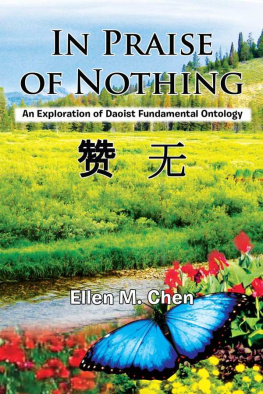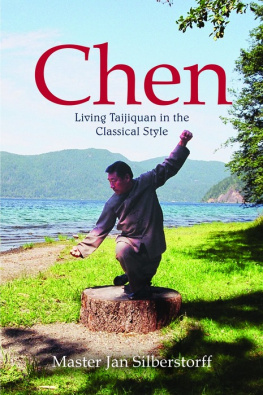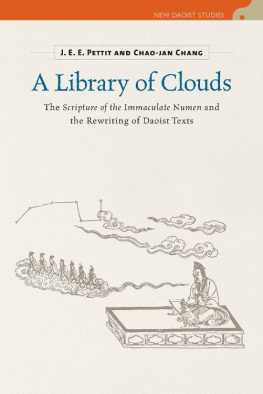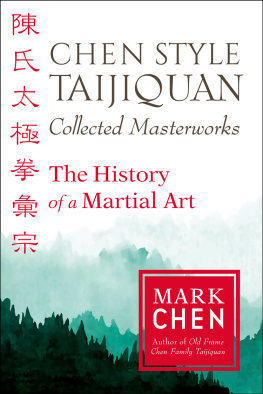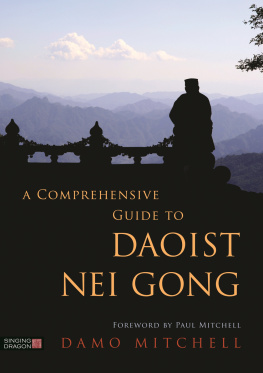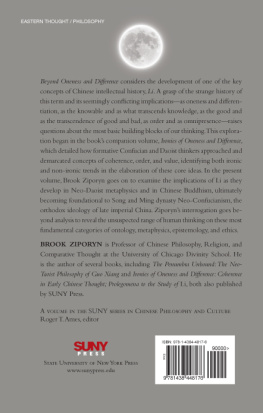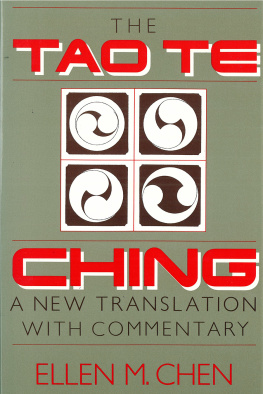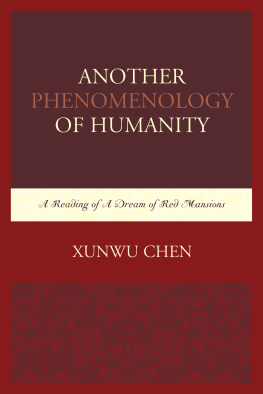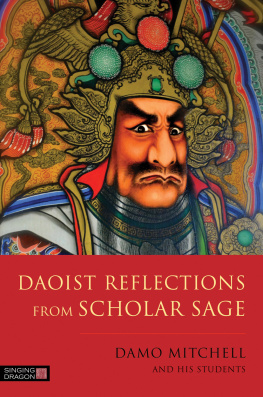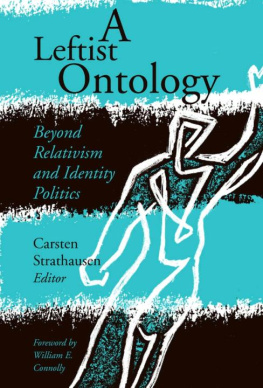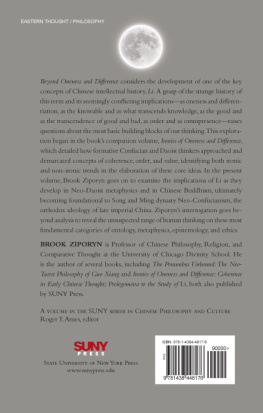Ellen M. Chen - In Praise of Nothing: An Exploration of Daoist Fundamental Ontology
Here you can read online Ellen M. Chen - In Praise of Nothing: An Exploration of Daoist Fundamental Ontology full text of the book (entire story) in english for free. Download pdf and epub, get meaning, cover and reviews about this ebook. year: 2010, publisher: Xlibris US, genre: Religion. Description of the work, (preface) as well as reviews are available. Best literature library LitArk.com created for fans of good reading and offers a wide selection of genres:
Romance novel
Science fiction
Adventure
Detective
Science
History
Home and family
Prose
Art
Politics
Computer
Non-fiction
Religion
Business
Children
Humor
Choose a favorite category and find really read worthwhile books. Enjoy immersion in the world of imagination, feel the emotions of the characters or learn something new for yourself, make an fascinating discovery.
- Book:In Praise of Nothing: An Exploration of Daoist Fundamental Ontology
- Author:
- Publisher:Xlibris US
- Genre:
- Year:2010
- Rating:5 / 5
- Favourites:Add to favourites
- Your mark:
- 100
- 1
- 2
- 3
- 4
- 5
In Praise of Nothing: An Exploration of Daoist Fundamental Ontology: summary, description and annotation
We offer to read an annotation, description, summary or preface (depends on what the author of the book "In Praise of Nothing: An Exploration of Daoist Fundamental Ontology" wrote himself). If you haven't found the necessary information about the book — write in the comments, we will try to find it.
Ellen M. Chen: author's other books
Who wrote In Praise of Nothing: An Exploration of Daoist Fundamental Ontology? Find out the surname, the name of the author of the book and a list of all author's works by series.
In Praise of Nothing: An Exploration of Daoist Fundamental Ontology — read online for free the complete book (whole text) full work
Below is the text of the book, divided by pages. System saving the place of the last page read, allows you to conveniently read the book "In Praise of Nothing: An Exploration of Daoist Fundamental Ontology" online for free, without having to search again every time where you left off. Put a bookmark, and you can go to the page where you finished reading at any time.
Font size:
Interval:
Bookmark:
In Praise of Nothing

In Praise of Nothing
An Exploration of Daoist Fundamental Ontology
Ellen M. Chen
Copyright 2011 by Ellen M. Chen.
Library of Congress Control Number: 2010917910
ISBN: Hardcover 978-1-4568-2610-9
Softcover 978-1-4568-2609-3
Ebook 978-1-4568-2611-6
All rights reserved. No part of this book may be reproduced or transmitted in any form or by any means, electronic or mechanical, including photocopying, recording, or by any information storage and retrieval system, without permission in writing from the copyright owner.
Xlibris Corporation
1-888-795-4274
www.Xlibris.com
87587
Contents
To the memory of my father
Philosophy is a conversation, a continuing discourse. Richard Kroner says:
The history of philosophy is like a long conversation in which many minds in many periods participate. Although there is much that is accidental in the conversation, and much that is not to the point, still there is an inner consistency and inner progress in its development. Only this conception makes a real history of philosophy possible and meaningful.
Different conversations have been carried on in different traditions. In this work, Daoism joins the world conversation for a fruitful dialogue in a common adventure.
As a student of Western thought, I have listened in for years to the world conversation, always finding a great divide between the Daoist and Western notions of the Ultimate reality; Daoist metaphysics is almost the mirror image of metaphysics as it is traditionally conceived in the West. Most prominent is the notion of Dao as Nothing, the significance of which I have been grappling with for more than twenty years (the research goes back almost half a century). The insights come slowly. Still, the theme of this volume is fresh and unexplored: a comparative study of Greek and Daoist metaphysics to unveil the root differences between the Western and Chinese views of the divine.
1. What is Daoism?
a. From Laozi to Confucius:
i. The Declension from Dao and De to Ren , Yi , and Li
ii. From Great Harmony to Small Prosperity
b. Political Theories Developed from the Laozi (Huang-Lao)
c. Mystical Thought Inspired by the Laozi (Lao-Zhuang)
d. Answering the Question, What is Daoism?
2. Whether There Is a Daoist Metaphysics
The Daodejing (the classic of Dao and De), known in China before the Han dynasty as the Laozi (the old master), was the most influential and most quoted work in ancient China. In the modern time, the existence of Laozi the man and the authorship and date of Laozi the book have been under heated debate, with no definitive conclusion. We shall not deal with these issues in this volume, having already touched on them previously.
The character Dao (  ) stands for the Ultimate or root of all in Chinese thought. Any serious Chinese in pursuit of the Ultimate may call himself a Daoist. Confucius said, If only I can hear Dao in the morning, I shall die content in the evening ( Analects , 4:8). After the importation of Buddhism to China, Buddhist monks and nuns often call themselves Dao persons (Dao ren ) and include the character Dao in their religious names. Neo-Confucianism, noted for its metaphysical speculations, named itself the school of Dao Learning (Dao Xue).
) stands for the Ultimate or root of all in Chinese thought. Any serious Chinese in pursuit of the Ultimate may call himself a Daoist. Confucius said, If only I can hear Dao in the morning, I shall die content in the evening ( Analects , 4:8). After the importation of Buddhism to China, Buddhist monks and nuns often call themselves Dao persons (Dao ren ) and include the character Dao in their religious names. Neo-Confucianism, noted for its metaphysical speculations, named itself the school of Dao Learning (Dao Xue).
In this volume we explore the meaning of Dao, the ancestor of all in the Daodejing , as Nothing. In its typically cryptic style, the Daodejing says the following in chapter 40:
Returning is the way Dao moves,
Gentle is the way Dao dispenses ( yong ).
Ten thousand things under heaven are born of being ( you ),
Being is born of Nothing ( wu ).
In the recently (1993) unearthed Guodian bamboo slips Daodejing A text, now the earliest extant Daodejing text, copied no later than 300 BC,
What exactly the Daodejing means by Nothing ( wu ) has so far not been fully explored. This is what we aim to bring out in this volume: the Daodejing s message of the creativity and benevolence of Dao the Ultimate as Nothing ( wu ).
Before we launch into our project of exploring the notion of Nothing in the Daodejing, we need to answer a more basic question: What is Daoism?
One way to answer the question What is Daoism? is to explain the Daodejing s view of the declension of the state of affairs in the world through the stages outlined in chapter 38 of the received text:
When Dao is lost, then there is de (nature);
When de is lost, then there is ren (humanity);
When ren is lost, then there is yi (righteousness);
When yi is lost, then there is li (rites or propriety).
According to the Daodejing , the best and aboriginal states are Dao and de , hence its very own title, Daodejing (the classic on Dao and De). While Dao stands for the ultimate creative principle, de stands for Daos coming forth to become the world of nature. Generally rendered as virtue in Confucian texts, de in the Daodejing points to the premoral state of the natural world as the manifestation of Daos benevolence in the world; as such, it represents also the benevolent policy of the Daoist ruler inspired by his vision of Dao. The Daodejing is a book on Dao and its creativity in the natural world ( de ); it is also a manual on the Daoist way of rulership. As Dao is the creativity resonating to the spontaneity of all things in nature, the ruler, by his policies of not-knowing, not-desiring, and not-acting, sets free the self-creativity of his people to flourish on their own. As such, de is the pristine state of nature and society. The Daodejing is a manual on Dao and its ways in nature ( de ) and the art of the Daoist ruler in imitation of Daos benevolence in political matters.
The next three levels, ren, yi, and li , treated in the Daodejing as declining steps from Dao and de , are cardinal virtues in Confucianism. Confuciuss central teaching is ren , human heartedness or compassion, rooted in ones love of kin. According to the Daodejing , ren as human love is a narrowing of Dao, the universal creative power, and de, the universal ways of nature. Daoism regards all creatures equally; heaven and earth as universal powers transcend human kindness ( Daodejing , ch. 5: Heaven and earth are not ren .) This statement has invited much condemnation from Confucians who regard heaven and earth to be humanly benevolent.
The next level, yi (  ), meaning justice or what is right to do, is an important topic for Mencius (371-289 BC), the second most revered Confucian thinker. When Mencius (371-289 BC), who studied under students of Zi Si (grandson of Confucius), spoke of rival schools to Confucianism in his own time, he mentioned Yang Zhu (440-360 BC[?]) and Modi (fl. 479-438 BC). These two thinkers stand for opposite choices by the individual concerning ones obligations to family and society. Yang Zhu, who refused to serve the interest of the state, was labeled a hedonist and a proto-Daoist. Mencius said of him, Yang Tzu chooses egoism. Even if he could benefit the Empire by pulling out one hair he would not do it ( Mencius , 7A:26; Lau, 187). Mencius considered Yang Zhu and Modi grave threats to the Confucian value of yi , righteousness as loyalty to ones family and state.
), meaning justice or what is right to do, is an important topic for Mencius (371-289 BC), the second most revered Confucian thinker. When Mencius (371-289 BC), who studied under students of Zi Si (grandson of Confucius), spoke of rival schools to Confucianism in his own time, he mentioned Yang Zhu (440-360 BC[?]) and Modi (fl. 479-438 BC). These two thinkers stand for opposite choices by the individual concerning ones obligations to family and society. Yang Zhu, who refused to serve the interest of the state, was labeled a hedonist and a proto-Daoist. Mencius said of him, Yang Tzu chooses egoism. Even if he could benefit the Empire by pulling out one hair he would not do it ( Mencius , 7A:26; Lau, 187). Mencius considered Yang Zhu and Modi grave threats to the Confucian value of yi , righteousness as loyalty to ones family and state.
The teachings current in the Empire are those of either the school of Yang or the school of Mo. Yang advocates everyone for himself, which amounts to a denial of ones prince; Mo advocates love without discrimination, which amounts to a denial of ones father. ( Mencius, 3B:9; cf. Lau, 114)
Next pageFont size:
Interval:
Bookmark:
Similar books «In Praise of Nothing: An Exploration of Daoist Fundamental Ontology»
Look at similar books to In Praise of Nothing: An Exploration of Daoist Fundamental Ontology. We have selected literature similar in name and meaning in the hope of providing readers with more options to find new, interesting, not yet read works.
Discussion, reviews of the book In Praise of Nothing: An Exploration of Daoist Fundamental Ontology and just readers' own opinions. Leave your comments, write what you think about the work, its meaning or the main characters. Specify what exactly you liked and what you didn't like, and why you think so.

